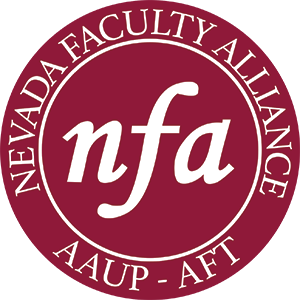FACULTY RIGHTS
Tenure
The Nevada Faculty Alliance vigorously defends tenure and the safeguards it affords faculty members. Tenure protects academic freedom, which is necessary for teachers and researchers in higher education. Individuals cannot fulfill their responsibilities if they fear loss of employment because of their speech, publications, or research due to political, corporate, religious, or other outside pressures. Tenure also promotes stability, giving individual faculty members the ability to develop stronger ties to the local community, mentor students, and pursue innovation. Although tenure only permits termination for cause or extraordinary circumstances, its benefits go well beyond the protection of individual faculty members. It protects the quality of teaching and maintains the institution’s integrity, thereby serving students, society, and the common good. |
Principles of Academic FreedomNFA adheres to and defends our members' rights under the Academic Freedom Policy adopted by our affiliate organization, AAUP (The American Association of University Professors) and utilized by the Nevada System of Higher Education in Title 2, Chapter 2 and Title 4, Chapter 1, Section 38.
Obligations of Academic Freedom
Protection of Academic Freedom Both the protection of academic freedom and the requirements of academic responsibility apply to all members of the TMCC faculty, not only to the full-time tenured and tenure-track academic faculty but also to other faculty on campus including administrative and part-time faculty. The exercise of Academic Freedom shall not be deemed insubordination which would impose a specific and dire disciplinary term to a protected act, denying the right to freedom from censorship or discipline promised by the Nevada System of Higher Education. Additional Resources on Academic Freedom
|
Shared GovernanceAccording to TMCC’s Shared Governance Principles, “Joint efforts in an academic institution require a productive interdependence of all stakeholders.” The AAUP “Statement on Government of Colleges and Universities” argues that shared governance is essential for maintaining autonomy, the welfare of the institution, the productive communication of ideas, and impactful decision making. Furthermore, all of us are partners in creating a vibrant campus community. TMCC-NFA will vigorously assert its role in Shared Governance at TMCC. Additional Resources on Shared Governance |
